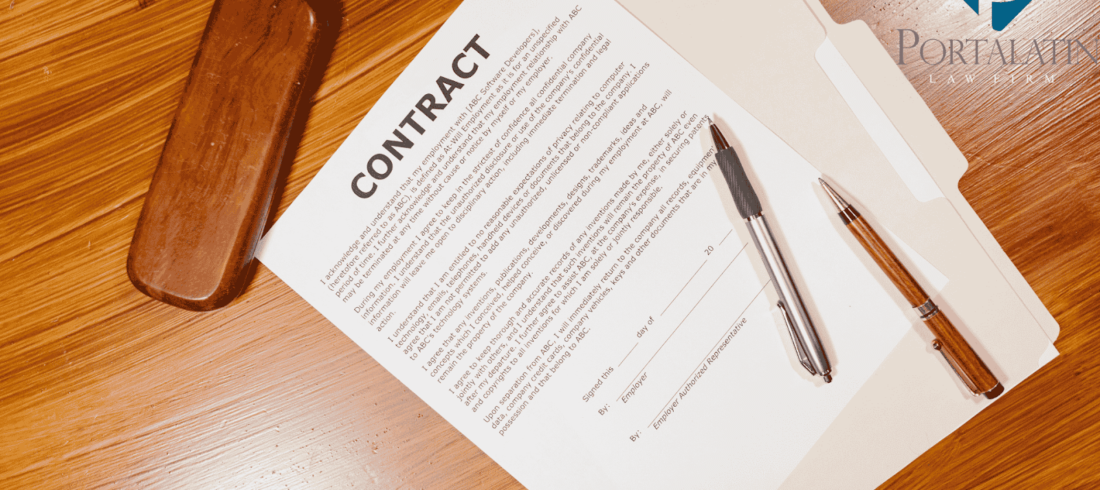Getting sued can put everything you’ve built at risk. A vague contract, a missed policy update, or one unhappy customer, and suddenly, your business is on the line. The good news? Most legal problems can be avoided with a few smart steps.
According to a 2024 report from Business Wire, 37% of small business owners faced employee-related litigation in the past year. That means more than one in three businesses dealt with a legal issue they might have prevented.
At Portalatin Business Law Firm, we work with entrepreneurs to set up legal protections that make sense from day one. We help business owners avoid costly mistakes through strong contracts, clear trademarks, and proactive planning.
Key Takeaways
- Poor contracts and policies cause most lawsuits.
- Insurance and training lower legal risks.
- Handle complaints early to avoid escalation.
- Protect your brand with trademarks and compliance.
What Are the Most Common Reasons Small Businesses Get Sued?
Running a business carries some risk, but lawsuits often come from avoidable problems. As reported by PIA, 23% of businesses involved in lawsuits said their legal expenses exceeded $250,000.
That’s a huge financial hit for a small company. Here’s where most small businesses get in trouble:
- Breach of contract: Not delivering what was promised in a signed agreement, whether with clients, vendors, or freelancers.
- Employee disputes: Claims of wrongful termination, harassment, discrimination, or unpaid wages.
- Customer injuries: Slip-and-fall accidents or safety issues at your location can lead to expensive liability claims.
- Copyright and trademark issues: Using someone else’s logo, slogan, or image, even unknowingly, can result in lawsuits.
- False or misleading advertising: Promises you can’t keep, fine print that’s unclear, or exaggerated results can all cause legal trouble.
- Data and privacy violations: Losing customer data or misusing it can lead to lawsuits under state or federal privacy laws.
Why Are Small Businesses at Greater Legal Risk?
Small businesses usually don’t have in-house lawyers or HR departments. They often rely on templates or verbal agreements and may skip formal policies to save time or money. That leaves more room for mistakes and lawsuits.
With fewer resources, they’re also more likely to miss training employees properly or keep up with changing regulations. All of this creates easy openings for legal problems.
How Can You Prevent Lawsuits with Strong Contracts and Agreements?
A solid contract is one of the easiest ways to protect your business. It sets clear rules, outlines responsibilities, and helps avoid misunderstandings that often lead to lawsuits.
Here’s how to make your contracts stronger:
- Put everything in writing: Never rely on verbal agreements. Always document the details, even for small jobs or long-time clients.
- Be specific: Clearly state what’s being done, deadlines, payment terms, and what happens if something goes wrong.
- Include key clauses: Common protections include:
- Limitation of liability: Caps your financial exposure if there’s a dispute.
- Dispute resolution: Lays out how disagreements will be handled (e.g., mediation, arbitration).
- Termination terms: Explains when and how the agreement can end.
- Define roles and responsibilities: Avoid vague terms. Be clear about who is doing what, when, and how.
Common Contract Mistakes That Lead to Legal Trouble
Try to avoid these common mistakes:
- Using generic templates without adapting them to your situation
- Forgetting to include payment terms or timelines
- Skipping signatures or leaving blanks
- Not reviewing contracts with a lawyer, especially for large deals
Even a basic contract can offer strong legal protection, as long as it’s clear, complete, and signed. If there’s one thing to tighten up in your business today, start with your agreements.
What Types of Business Insurance Protect Against Lawsuits?

Insurance is your financial safety net. It doesn’t stop lawsuits, but it helps cover legal costs, settlements, or damages, so one mistake doesn’t destroy your business. A 2025 Small Business Credit Survey found that 91% of small businesses carry liability insurance, but cost remains a concern for many.
Here are the main types of business insurance that protect against lawsuits:
- General liability insurance: Covers customer injuries, property damage, and claims like slander or libel.
- Professional liability insurance (errors & omissions): Protects you if a client claims your advice or service caused them harm.
- Employment practices liability insurance (EPLI): Covers claims of discrimination, harassment, or wrongful termination from employees.
- Cyber liability insurance: Pays for legal costs if customer data is breached or stolen.
- Product liability insurance: If you sell products, this protects you if someone claims a defect caused harm.
What Business Insurance Coverage Do You Need?
| Insurance Type | What It Covers | Who Needs It |
| General Liability | Injuries, property damage, slander | Almost every business |
| Professional Liability (E&O) | Mistakes in services or advice | Consultants, agencies, freelancers |
| EPLI | Employee-related legal claims | Any business with staff |
| Cyber Liability | Data breaches and digital attacks | Online stores, service businesses |
| Product Liability | Harm caused by products you sell | Retailers, manufacturers |
How Do You Choose the Right Insurance Provider?
- Work with a broker: They can help match your risks with the right policies.
- Check for industry-specific options: Some insurers offer tailored plans for contractors, salons, marketers, etc.
- Compare quotes carefully: Look at coverage limits, exclusions, and deductibles, not just price.
How Should You Train and Manage Employees to Reduce Legal Risk?
Employees are a major asset, but they can also be a legal risk if you’re not careful. Most lawsuits from inside a business come from poor communication, unclear policies, or bad documentation.
Here’s how to lower that risk:
- Write and share an employee handbook: This should explain your expectations, workplace rules, and company policies. Include topics like time off, harassment, safety, and social media use.
- Use signed agreements: Have employees sign that they’ve read and understood your policies, especially around conduct and confidentiality.
- Provide regular training: Cover harassment, discrimination, safety protocols, and respectful workplace behavior. Keep records of who attended.
- Document everything: If there’s a performance issue, document each conversation and step taken. If a situation escalates, you’ll have proof that you followed the proper process.
What Policies Belong in Your Employee Handbook?
At a minimum, your handbook should cover:
- Code of conduct
- Anti-harassment and anti-discrimination policies
- Disciplinary procedures
- Time-off and leave policies
- Safety and emergency procedures
- Complaint and reporting process
How Can You Prevent Workplace Disputes?
- Be fair and consistent with how you apply policies.
- Handle complaints quickly and seriously.
- Set up private, safe ways for employees to raise concerns.
Why Is Documenting HR Processes Important?
In court, it’s your word against theirs unless you have proof. Documentation shows that you acted fairly and followed a process. It helps protect your business and shows good faith in case you ever face an employee claim.
How Do You Stay Compliant with Business Laws and Regulations?
Legal trouble often starts when a business breaks a rule, sometimes without even realizing it. Laws vary by industry, state, and even city, so it’s important to stay updated and organized.
What Compliance Rules Affect Your Industry?
That depends on what you do, but here are common areas where small businesses run into problems:
- Licensing: Running your business without the right permits or licenses
- Tax reporting: Misfiling or missing deadlines for local, state, or federal taxes
- Employment laws: Violating wage rules, overtime laws, or worker classification rules
- Health and safety: Not following OSHA or local health department standards
- Advertising and marketing: Making unverified claims or not following ad disclosure rules
Where Can You Find Reliable Compliance Checklists?
- Your local Small Business Administration (SBA) office or website
- Chamber of Commerce resources
- Trade associations for your specific industry
You can also ask your accountant, lawyer, or business advisor for tailored checklists.
What is the Best Way to Handle Customer Complaints and Avoid Lawsuits?

Unhappy customers don’t always start with a lawsuit, but if they feel ignored, mistreated, or dismissed, things can escalate fast. How you respond matters just as much as what went wrong.
How Can You Resolve Disputes Before They Escalate?
Start by listening. Most customers just want to be heard and taken seriously. Even if they’re angry, stay calm and focus on solving the problem.
Here’s what helps:
- Acknowledge their complaint quickly, don’t let it sit for days
- Offer a fair resolution, like a refund, credit, or fix
- Follow up to make sure they’re satisfied
Sometimes, that extra bit of attention is all it takes to prevent legal threats.
When Should You Involve a Lawyer?
If a customer uses words like “I’ll sue” or “I’m contacting my attorney,” take it seriously. Don’t argue. Instead:
- Respond professionally and document everything
- Stop discussing the issue in writing until you’ve spoken with a lawyer
- Notify your insurance provider, especially if you have general liability coverage
A lawyer can help you understand your risks and how to respond without making things worse.
What Should You Do If Someone Threatens to Sue Your Business?
Even with the best precautions, legal threats can happen. A customer, vendor, or former employee might say they’re “talking to a lawyer” or “filing a lawsuit.” Stay calm. What you do next can protect or hurt your business.
Immediate Steps to Take When Facing a Legal Threat
- Don’t panic or argue: Stay professional. Reacting emotionally or admitting fault could be used against you.
- Stop communicating in writing: Don’t keep emailing or texting the other party until you’ve spoken to a lawyer.
- Document everything: Save emails, messages, contracts, photos, anything related to the issue.
- Notify your insurance provider: If the threat relates to something your policy covers, they may provide legal help or cover costs.
When to Contact a Lawyer or Insurance Company
- If the threat mentions legal action, court, or a lawyer
- If someone sends a formal letter or “cease and desist” notice
- If there’s potential for damage to your reputation or financial loss
A quick consult with a lawyer can help you understand what’s real, what’s just talk, and what steps to take next. Many business insurance policies also include legal support, use it.
Protect Your Business Before Problems Start
Lawsuits can cost you time, money, and focus, but most are preventable with the right legal foundation. At Portalatin Business Law Firm, we help business owners avoid those risks by creating clear contracts, securing trademarks, and making sure everything is set up right from the start.
If you’re ready to put real protection in place, visit our contact page to get in touch. Let’s make sure your business is covered before it needs to be.




